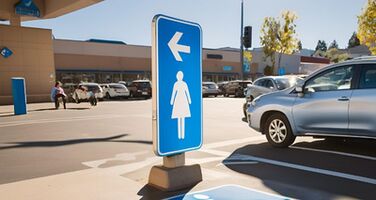
Personal Stories: How a Disabled Parking Permit Helped During My Pregnancy
Introduction
Pregnancy is often depicted as a time of joy and anticipation, but it also comes with a multitude of physical and emotional challenges. As a woman’s body undergoes profound changes to accommodate a growing baby, everyday tasks that were once simple can become daunting. Walking long distances, carrying groceries, and navigating crowded parking lots can be overwhelming, especially during the later stages of the maternal phase or when complications arise. For some women, a disability pass becomes an essential tool, providing much-needed relief and making daily life more manageable.
This article delves into the personal stories of women who found that having a disability pass during while expecting was not just convenient but vital. These testimonials and case studies highlight the benefits of having a special pass, the challenges these women faced, and how the disability pass made a significant difference in their day-to-day lives. Through their stories, we aim to shed light on the real impact of disability passes during the maternal phase and offer insights for other expecting mothers who may be facing similar challenges.
Understanding Disabled Parking Permits for Pregnant Women
What Is a Disabled Parking Permit?
A disabled parking permit, also known as a handicap placard, is a special pass issued by state authorities that allows individuals with mobility impairments to park in designated accessible parking spaces. These spaces are typically located closer to building entrances and provide additional room for maneuvering, making it easier for individuals with physical challenges to enter and exit their vehicles.
Who Qualifies for a Disabled Parking Permit?
While disability passes are often associated with long-term disabilities, they are also available to individuals with temporary mobility impairments. During gestation, some women experience conditions that significantly impact their ability to walk or stand for extended periods. These conditions can include:
- Severe pelvic pain or pelvic girdle pain (PGP)
- Sciatica or other nerve-related pain
- Extreme fatigue or weakness
- High-risk pregnancy with complications requiring limited mobility
- Post-surgical recovery (e.g., after a cesarean section)
In such cases, pregnant women may qualify for a temporary handicap pass, allowing them to access reserved parking spaces that are closer to entrances and easier to navigate.
How to Apply for a Disabled Parking Permit Throughout Gestation
The process for applying for a disability pass during pregnancy varies by state, but it generally involves obtaining medical certification from a handicapMD healthcare provider. The provider must confirm that the woman’s pregnancy-related condition significantly impairs her mobility. Once the medical certification is obtained, the woman can submit an application to her state’s Department of Motor Vehicles (DMV) or equivalent agency. Upon approval, a temporary disability pass is issued, which can be used throughout the gestation or the period of limited mobility.
Personal Stories: How a Disabled Parking Permit Made a Difference
Emma’s Story: Finding Relief from Pelvic Girdle Pain
Emma, a 32-year-old teacher from California, was in her second trimester when she began experiencing severe pelvic girdle pain (PGP). What started as a mild discomfort quickly escalated into excruciating pain that made walking, standing, and even sitting for long periods unbearable.
“I was in so much pain that walking from my car to the school building became a daunting task,” Emma recalls. “I would often arrive at work already exhausted from the effort of just getting there. I knew something had to change.”
Emma’s doctor diagnosed her with PGP, a common but painful condition during the maternal phase that affects the pelvic joints. Recognizing the impact on her mobility, Emma’s doctor recommended applying for a temporary disability tag.
“I was hesitant at first,” Emma admits. “I didn’t think I ‘qualified’ for a disability pass because I wasn’t permanently disabled. But my doctor explained that the special pass was there to help people like me who were struggling with temporary mobility issues.”
With her doctor’s support, Emma applied for and received a temporary disability pass. The difference was immediate and profound.
“Having the special pass allowed me to park closer to the entrance, which meant I wasn’t completely drained by the time I got to my classroom,” Emma says. “It took a huge burden off my shoulders and allowed me to focus more on my job and less on the pain.”
For Emma, the disability pass was a lifesaver during the most challenging weeks of her expectancy. It gave her the mobility and energy to continue working and caring for her students, even as her pregnancy progressed.
Sarah’s Story: Navigating High-Risk Pregnancy Complications
Sarah, a 28-year-old accountant from New York, had a high-risk gestation condition due to preeclampsia, a condition characterized by high blood pressure that can lead to serious complications for both mother and baby. Her doctor placed her on bed rest for part of her pregnant state, but even when she was allowed limited mobility, Sarah found it difficult to carry out everyday tasks.
“Just walking up a flight of stairs or standing for too long would make me dizzy and lightheaded,” Sarah explains. “I was constantly worried about my blood pressure spiking, and that made simple things like going to the grocery store incredibly stressful.”
Given her high-risk status, Sarah’s doctor recommended that she apply for a temporary disability pass to reduce the physical strain of walking long distances.
“At first, I didn’t think I needed it,” Sarah says. “But as my pregnancy progressed and my symptoms worsened, I realized how important it was to minimize any unnecessary stress on my body.”
With her disability pass, Sarah was able to park closer to entrances, reducing the time and effort required to get to her destinations. This was especially important when she needed to attend frequent medical appointments to monitor her condition.
“Having the disability tag made it so much easier to get to my doctor’s office, which was a huge relief,” Sarah recalls. “I could focus on my health and my baby’s health without worrying about whether I’d be able to make it from the parking lot to the building without feeling like I was going to pass out.”
For Sarah, the disability pass was a crucial support tool that helped her manage the challenges of a high-risk gestational condition. It provided her with the accessibility she needed to safely attend appointments and carry out essential tasks without compromising her health.
Megan’s Story: Coping with Post-Cesarean Section Recovery
Megan, a 35-year-old marketing executive from Florida, had a planned cesarean section (C-section) due to complications that arose late in her pregnancy. While the surgery went smoothly, Megan was unprepared for the challenges of recovery.
“I knew recovery would be tough, but I didn’t realize just how much it would impact my ability to do even the simplest things, like getting in and out of the car,” Megan recalls. “Every movement was painful, and walking any distance felt like an impossible task.”
Megan’s doctor advised her to apply for a temporary disability pass to help with her post-surgical recovery. The special tag would allow her to park in accessible spaces, reducing the distance she needed to walk and making it easier to navigate with her newborn.
“I can’t overstate how much of a difference the tag made during those first few weeks after my C-section,” Megan says. “It allowed me to go to follow-up appointments, pick up prescriptions, and even take my baby to the pediatrician without worrying about whether I’d be able to make it from the parking lot to the door.”
The disability pass also gave Megan the confidence to regain her independence as she healed. While she initially relied on her partner for most outings, the tag allowed her to start venturing out on her own as she gradually regained her strength.
“Having that disability tag was a key part of my recovery,” Megan reflects. “It gave me the ability to take things at my own pace and focus on healing without feeling overwhelmed by the physical demands of everyday life.”
Jessica’s Story: Managing Sciatica During Pregnancy
Jessica, a 29-year-old nurse from Texas, was well into her third trimester when she began experiencing severe sciatica, a condition where the sciatic nerve becomes compressed, leading to sharp, shooting pain down the back and legs. For Jessica, the pain was so intense that it made standing, walking, and even sitting for long periods unbearable.
“As a nurse, I’m used to being on my feet all day, but this pain was something else entirely,” Jessica recalls. “It felt like a lightning bolt shooting down my leg every time I took a step.”
Jessica’s doctor diagnosed her with sciatica, a common condition during motherhood journey as the growing uterus can press against the sciatic nerve. Recognizing the impact on her mobility, her doctor recommended that Jessica apply for a temporary handicap tag.
“I was relieved to have an option that could help me get through the rest of my pregnancy,” Jessica says. “With the handicap pass, I could park closer to the entrance of the hospital where I worked, which made a huge difference in my ability to keep working as long as possible.”
The pass also made Jessica’s daily life outside of work more manageable. Tasks that would have been difficult or painful, such as grocery shopping or running errands, became more accessible with the use of designated parking spaces.
“Having the handicap pass meant I didn’t have to choose between staying home in pain or pushing myself to walk long distances,” Jessica explains. “It allowed me to continue doing the things I needed to do without exacerbating my condition.”
For Jessica, the accessible tag was more than just a convenience; it was a tool that enabled her to maintain her independence and continue working up until her delivery date, despite the challenges posed by sciatica.
Emily’s Story: Overcoming Extreme Fatigue
Emily, a 27-year-old social worker from Ohio, experienced extreme fatigue throughout her maternal phase, a common symptom that can be exacerbated by anemia, hormonal changes, and the physical demands of growing a baby. For Emily, this fatigue was more than just feeling tired—it was a debilitating exhaustion that left her struggling to complete basic tasks.
“I was constantly exhausted, no matter how much sleep I got,” Emily says. “It felt like my body was running on empty all the time, and even simple things like walking to my car or going to the store felt overwhelming.”
After discussing her symptoms with her doctor, Emily was diagnosed with pregnancy-related anemia, which was contributing to her extreme fatigue. Her doctor recommended iron supplements and other treatments but also suggested that Emily apply for a temporary accessible tag to help manage her energy levels.
“At first, I didn’t think I needed a disability tag —I thought I just needed to push through it,” Emily admits. “But my doctor explained that the tag could help me conserve my energy for the things that really mattered.”
With her disability pass, Emily was able to park in accessible spaces closer to her destinations, which significantly reduced the physical strain of walking long distances.
“The disability tag made a world of difference,” Emily says. “It allowed me to save my energy for the things that were most important, like taking care of myself and preparing for my baby’s arrival.”
For Emily, the disability pass was a critical support tool that helped her manage the challenges of extreme fatigue during her gestation journey. It allowed her to focus on her health and well-being without feeling overwhelmed by the physical demands of everyday life.
The Benefits of Disabled Parking Permits During Pregnancy
The personal stories shared above highlight the significant impact that disabled parking permits can have on pregnant women facing mobility challenges. While each woman’s experience is unique, several common benefits emerge:
1. Reduced Physical Strain
Pregnancy can bring about various physical challenges, including pain, fatigue, and limited mobility. Accessible tags allow pregnant women to park closer to their destinations, reducing the physical strain of walking long distances. This can be particularly beneficial for women experiencing conditions like sciatica, pelvic girdle pain, or severe fatigue.
2. Increased Independence
For many women, pregnancy-related mobility issues can lead to a loss of independence, as they may need assistance with tasks that were once simple. A disability tag can help pregnant women regain some of their independence by making it easier for them to navigate public spaces, attend appointments, and run errands on their own.
3. Improved Access to Medical Care
Frequent medical appointments are a common part of the maternal phase, especially for women with high-risk pregnancies or complications. Accessible passes make it easier for pregnant women to access medical facilities, ensuring they receive the care they need without unnecessary physical strain.
4. Enhanced Safety
Navigating parking lots can be challenging and potentially dangerous for pregnant women, particularly those with limited mobility or balance issues. Accessible passes allow women to park in designated accessible spaces, which are often wider and located closer to building entrances, reducing the risk of falls or accidents.
5. Decreased Stress
Pregnancy can be a stressful time, and added physical challenges can exacerbate this stress. Accessible passes provide a practical solution to some of the mobility challenges that pregnant women face, helping to reduce stress and allowing them to focus on their health and well-being.
Section on Disabled Parking Permits for Women During Pregnancy
While disability tags are typically associated with permanent disabilities, they are also available to individuals with temporary mobility impairments, including pregnant women experiencing significant physical challenges. These passes can provide essential support during the maternal phase, particularly for women dealing with conditions like pelvic girdle pain, sciatica, high-risk pregnancy complications, extreme fatigue, or post-surgical recovery.
To apply for a disability tag throughout gestation, women typically need to obtain medical certification from a handicapMD healthcare provider, confirming that their pregnancy-related condition significantly impairs their mobility. The process for applying varies by state, but most involve submitting the medical certification along with an application to the state’s Department of Motor Vehicles (DMV) or equivalent agency.
It is important to note that not all pregnant women will qualify for a disability tag, as the pass is intended for those with significant mobility challenges. However, for those who do qualify, the pass can be a valuable tool for managing the physical demands of pregnancy.
Conclusion
Pregnancy is a time of profound change and challenge, and for many women, a disability pass can make a significant difference in their ability to navigate daily life. The personal stories shared in this article illustrate the real impact that these special passes can have, from reducing physical strain and increasing independence to improving access to medical care and enhancing safety.
For pregnant women facing mobility challenges, a disability pass is more than just a convenience—it is a crucial support tool that can help them manage the physical demands of carrying a baby and focus on what matters most: their health and the health of their baby.
As more women share their experiences and stories, it is clear that accessible passes play an important role in supporting pregnant women during a time of great need. Whether dealing with severe pain, high-risk complications, or post-surgical recovery, these passes provide a lifeline for women who need extra support to navigate the challenges throughout gestation.
References
- American College of Obstetricians and Gynecologists (ACOG). (2020). "Guidelines for Obstetric Care."
- Mayo Clinic. (2021). "Pregnancy: Physical Changes and Discomforts."
- National Highway Traffic Safety Administration (NHTSA). (2019). "Disabled Parking Placards: Rules and Enforcement."
- Department of Motor Vehicles (DMV) – Various States. (2023). "Disabled Parking Permit Regulations."
- March of Dimes. (2020). "Managing Pregnancy-Related Mobility Issues."
- ADA National Network. (2022). "Understanding Your Rights: Disabled Parking and Accessibility."
.png)






